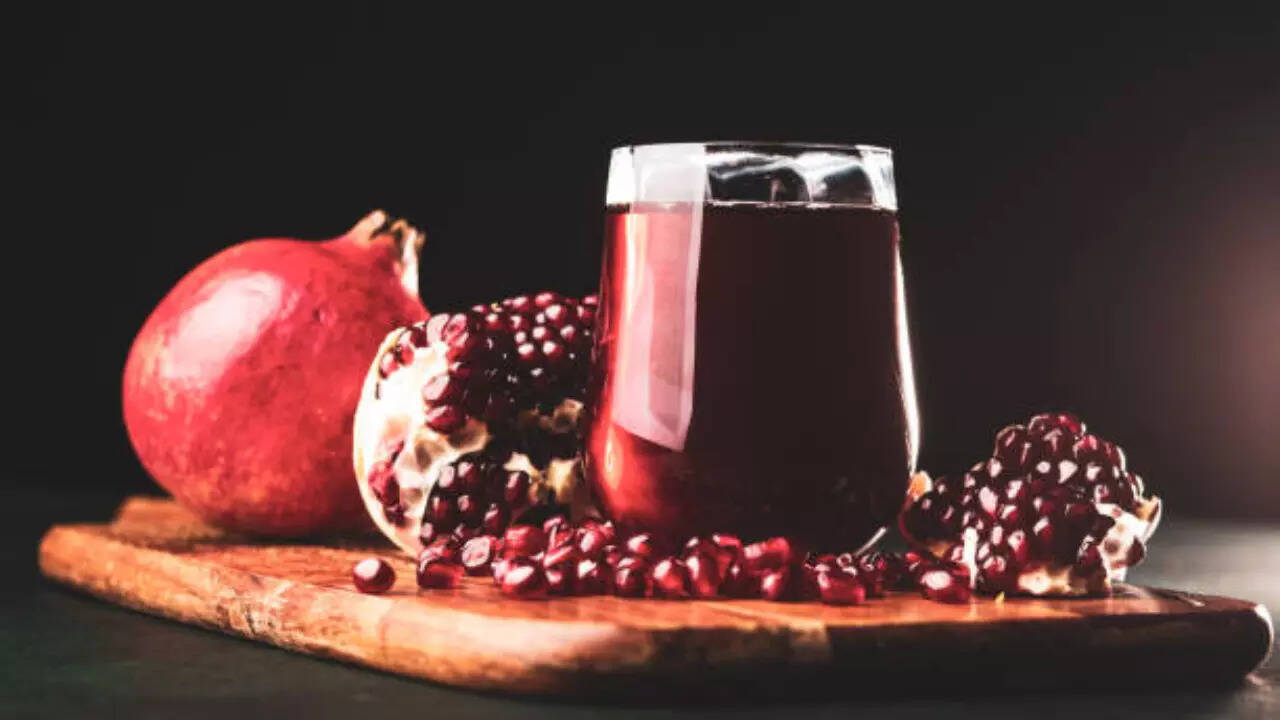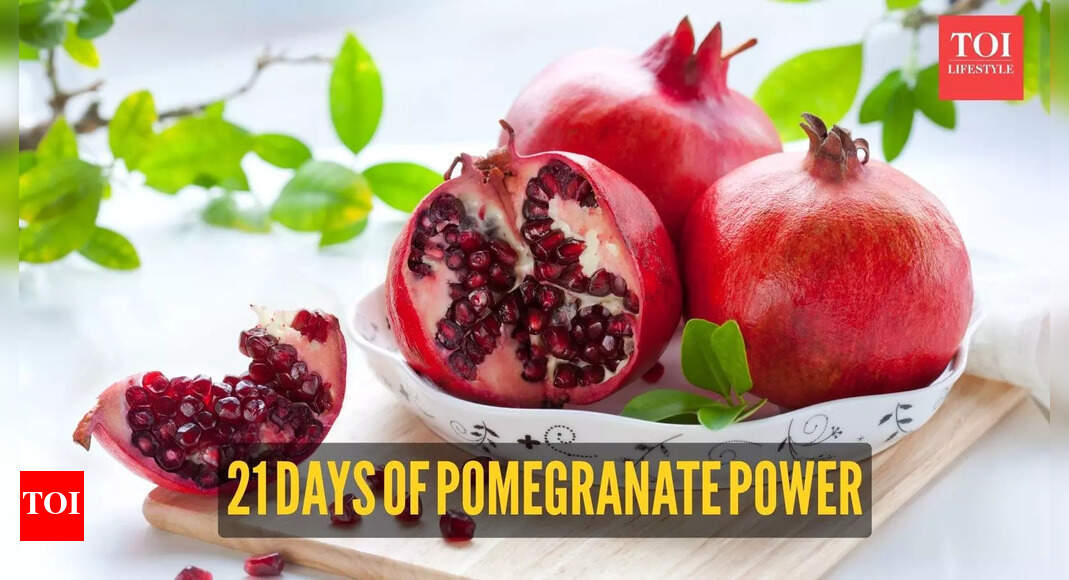 Imagine reaching for a small bowl of ruby‑red seeds from the Pomegranate each day for 21 days. Over that period, our body may start showing subtle but meaningful changes. Here are 7 noticeable shifts that could occur when this hearty fruit becomes a routine part of your diet. Take a lookSkin vitality and subtle glowEating pomegranate seeds daily provides a steady intake of polyphenols and antioxidants. UCLA health states that pomegranate phytonutrients reduce oxidative stress in skin after UV exposure.
Imagine reaching for a small bowl of ruby‑red seeds from the Pomegranate each day for 21 days. Over that period, our body may start showing subtle but meaningful changes. Here are 7 noticeable shifts that could occur when this hearty fruit becomes a routine part of your diet. Take a lookSkin vitality and subtle glowEating pomegranate seeds daily provides a steady intake of polyphenols and antioxidants. UCLA health states that pomegranate phytonutrients reduce oxidative stress in skin after UV exposure.
Anar Benefits: 5 reasons to eat a bowl of pomegranate everyday
After a span of approximately two to three weeks, you may begin to observe that your skin exhibits a slightly more luminous appearance, appearing less fatigued or lacking in vibrancy. While fine lines may not completely disappear in such a short period, you might find that the overall complexion and the way your skin interacts with light—and copes with stress—can feel notably enhanced.Tip: Pair your pomegranate bowl with a glass of water to keep skin hydration consistent.Calm digestion and gentle gut supportPomegranate seeds contain fibre, and the fruit’s compounds show anti‑inflammatory effects in the gut, as per a study published in the NIH.Within 21 days, you may experience smoother digestion, fewer bloating episodes, or more regularity. This isn’t a dramatic cleanse, but adding a small bowl daily gives your gut an extra dose of protective antioxidants.Note: If sensitive to fibre, introduce gradually. A subtle heart‑health boostPolyphenols in pomegranate have been linked to lowered systolic blood pressure and better arterial health.Over three weeks, you might not feel the change, but your blood vessels may be functioning better, less “strain,” smoother flow. For someone at risk of hypertension, this daily habit could gently support heart health.Always check with your physician, especially if taking blood‑pressure medications.Refreshment in recovery and mild movementEmerging evidence from a research published in Science Direct suggests pomegranate derivatives can enhance exercise recovery and reduce muscle soreness.If you work out or stay active, after 21 days you might notice less post‑workout ache or quicker bounce‑back. The effect won’t be dramatic, but your body may thank you in little ways, ease of movement, less stiffness.Complement it with good sleep and hydration.Oral health: a hidden benefitLess expected but interesting: pomegranate compounds show promise in reducing gum bleeding and dental‑plaque bacteria.In three weeks of daily consumption, you might find your gums feel a little less sensitive, or your oral hygiene may seem more “solid.” It’s not a substitute for brushing and flossing, but a supportive habit.Consider pairing the seeds with yoghurt or cheese, which helps neutralise acidity.
A subtle heart‑health boostPolyphenols in pomegranate have been linked to lowered systolic blood pressure and better arterial health.Over three weeks, you might not feel the change, but your blood vessels may be functioning better, less “strain,” smoother flow. For someone at risk of hypertension, this daily habit could gently support heart health.Always check with your physician, especially if taking blood‑pressure medications.Refreshment in recovery and mild movementEmerging evidence from a research published in Science Direct suggests pomegranate derivatives can enhance exercise recovery and reduce muscle soreness.If you work out or stay active, after 21 days you might notice less post‑workout ache or quicker bounce‑back. The effect won’t be dramatic, but your body may thank you in little ways, ease of movement, less stiffness.Complement it with good sleep and hydration.Oral health: a hidden benefitLess expected but interesting: pomegranate compounds show promise in reducing gum bleeding and dental‑plaque bacteria.In three weeks of daily consumption, you might find your gums feel a little less sensitive, or your oral hygiene may seem more “solid.” It’s not a substitute for brushing and flossing, but a supportive habit.Consider pairing the seeds with yoghurt or cheese, which helps neutralise acidity. Mood of calm, thanks to reduced inflammationChronic low‑grade inflammation often nudges mood, energy, even sleep. Pomegranate’s anti‑inflammatory potential is well‑documented in a study published in the journal ‘Antioxidant.’After 21 days, you may notice a slight lift in how you feel: less mental “fogginess”, fewer irritations, maybe a smoother morning start. These changes are subtle, nevertheless real.Track this with a journal: note mornings before starting and after three weeks.Supporting memory and cognition, quietlyThough still exploratory, research indicates pomegranate intake may support brain health by reducing oxidative stress in brain tissue.Within 21 days you might not become memorably sharper, but simple tasks may feel easier, mental fatigue may dip. This benefit builds gradually, so the habit matters more than the short‑term jump.Pair the fruit with mental breaks, reading, or light puzzles to reinforce the benefit.Disclaimer: This article is for general information and not a substitute for medical advice. If you have an existing health condition (such as high blood pressure, diabetes, or medication interactions) please consult a qualified healthcare provider before making dietary changes. While pomegranate shows promise in many areas, individual responses vary and the fruit should complement, not replace, a balanced diet and healthy lifestyle.
Mood of calm, thanks to reduced inflammationChronic low‑grade inflammation often nudges mood, energy, even sleep. Pomegranate’s anti‑inflammatory potential is well‑documented in a study published in the journal ‘Antioxidant.’After 21 days, you may notice a slight lift in how you feel: less mental “fogginess”, fewer irritations, maybe a smoother morning start. These changes are subtle, nevertheless real.Track this with a journal: note mornings before starting and after three weeks.Supporting memory and cognition, quietlyThough still exploratory, research indicates pomegranate intake may support brain health by reducing oxidative stress in brain tissue.Within 21 days you might not become memorably sharper, but simple tasks may feel easier, mental fatigue may dip. This benefit builds gradually, so the habit matters more than the short‑term jump.Pair the fruit with mental breaks, reading, or light puzzles to reinforce the benefit.Disclaimer: This article is for general information and not a substitute for medical advice. If you have an existing health condition (such as high blood pressure, diabetes, or medication interactions) please consult a qualified healthcare provider before making dietary changes. While pomegranate shows promise in many areas, individual responses vary and the fruit should complement, not replace, a balanced diet and healthy lifestyle.

